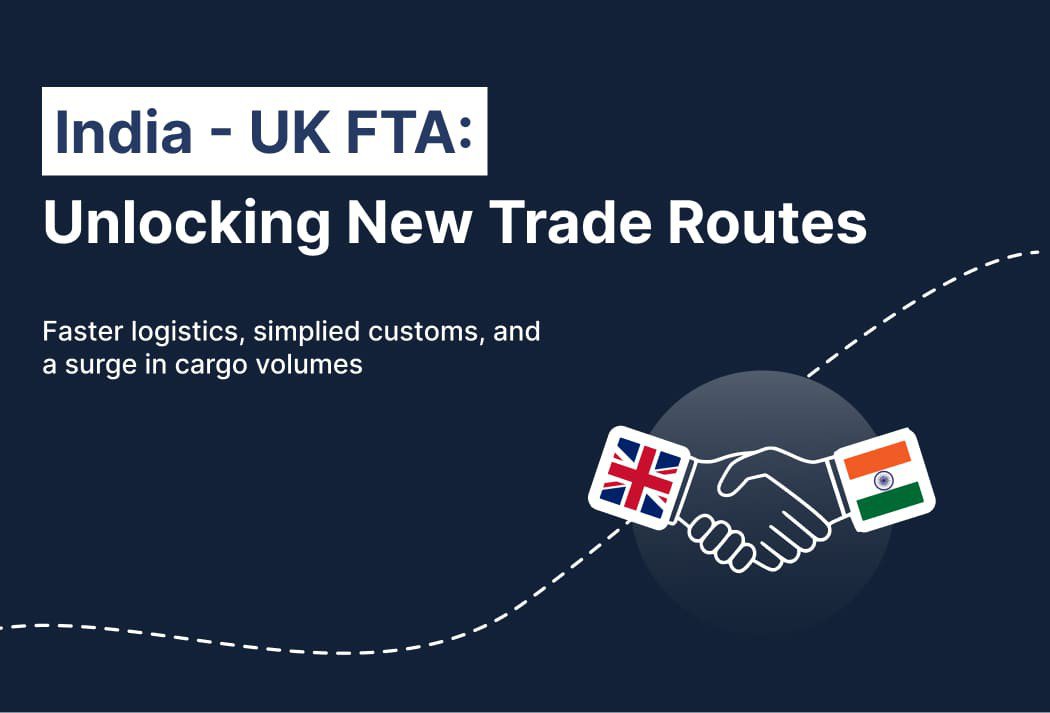
In a historic development for global trade and supply chain networks, India and the United Kingdom officially concluded their long-anticipated Free Trade Agreement (FTA) on May 6, 2025. Announced by Hon’ble Prime Minister Shri Narendra Modi and UK Prime Minister Sir Keir Starmer, this landmark deal not only enhances trade and economic ties but also unlocks immense potential for the logistics, freight forwarding, and supply chain sectors.
At FreightMango, where we facilitate international cargo movement, this FTA signals a transformational shift in trade logistics between India and the UK — improving trade routes, reducing transit bottlenecks, and simplifying customs procedures for our clients and partners.
How the India–UK FTA Boosts Logistics and Trade Facilitation
While tariff concessions and services trade headlines grab attention, the real backbone of this agreement lies in its impact on cross-border logistics infrastructure, operational efficiency, and cargo movement. Here’s how:
99% Indian Exports Get Zero-Duty Access: Surge in Cargo Volumes
The agreement eliminates tariffs on 99% of Indian exports to the UK, covering sectors like:
- Textiles
- Marine products
- Leather
- Footwear
- Auto components
- Engineering goods
- Organic chemicals
- Gems & Jewellery
This zero-duty access is expected to substantially increase trade volumes, leading to higher demand for containerized cargo, reefer shipments, and specialized freight services.
Freight forwarders, NVOCCs, and logistics platforms like FreightMango will see expanded opportunities in handling, warehousing, and last-mile delivery services, especially for labor-intensive and perishable commodities like seafood and textiles.
Resolution of Non-Tariff Barriers & Streamlined Customs Processes
The FTA ensures that non-tariff barriers (NTBs) that previously delayed shipments or created administrative hurdles for Indian exports are now addressed.
For logistics operators, this translates to:
- Faster clearance at ports and airports
- Simplified customs documentation
- Harmonized product standards and safety requirements
- Reduced compliance costs for exporters and shippers
This will improve port efficiency, cargo turnaround times, and overall supply chain reliability between India and the UK.
Focus on Digital Trade Logistics and Smart Supply Chains
The agreement includes ambitious provisions for digitally delivered services and regulatory cooperation. This aligns directly with the rise of smart, technology-led logistics platforms like FreightMango, offering:
- End-to-end cargo tracking
- Digital customs documentation
- Freight booking APIs
- E-invoicing and trade finance integrations
With increased bilateral trade in sectors like IT, professional services, and education, the demand for efficient digital documentation management and seamless cross-border freight services will surge.
Facilitated Professional Mobility: More Trade Personnel on the Move
The agreement introduces simplified visa and mobility provisions for logistics professionals, contractual service suppliers, and independent specialists. This means:
- Easier access for Indian logistics managers, freight consultants, and supply chain engineers to UK markets.
- Enhanced opportunities for joint ventures and operational collaborations between Indian and UK logistics firms.
Projected Trade Surge: USD 60 Billion to USD 120 Billion by 2030
With bilateral trade currently at USD 60 billion and projected to double by 2030, the logistics sector must gear up for a twofold increase in cargo volumes, container traffic, and multimodal operations.
Key export-import hubs like Nhava Sheva, Chennai, Felixstowe, London Gateway, and Southampton are expected to witness a surge in container throughput, while air cargo demand for perishables, pharmaceuticals, and express shipments will rise.
Strategic Supply Chain Implications
The India–UK FTA is not just a trade deal — it’s a logistics enabler that:
- Strengthens India–Europe logistics corridors
- Enhances supply chain resilience by reducing dependency on intermediaries
- Opens up cross-docking, warehousing, and bonded logistics parks opportunities
- Encourages investment in port infrastructure and cold chain logistics
What’s Next: Implementation & Future Prospects
Both nations have committed to swift implementation of the agreement. Focus areas include:
- Streamlining customs processes
- Adopting global regulatory standards
- Strengthening logistics and digital infrastructure
- Facilitating professional and student mobility
This deal also sets a gold standard for India's future FTAs, particularly with nations like Australia, the EU, and Canada.
Conclusion: What This Means for FreightMango and Global Shippers
For a logistics platform like FreightMango, this FTA means:
- More diverse cargo types and higher shipment volumes to handle
- Faster, more reliable customs clearances
- Greater scope for multimodal logistics solutions
- Enhanced partnerships with UK-based freight operators and third-party logistics (3PL) firms
As India strengthens its integration into global value chains and the UK cements its post-Brexit trade relations, the logistics industry stands as a key enabler of this transformation.
At FreightMango, we are fully geared to support this new wave of India–UK trade logistics, providing shippers, exporters, and importers with the tools, infrastructure, and digital solutions to make the most of this historic trade agreement.





 Get instant quote
and compare offers in real time
Get instant quote
and compare offers in real time